Blog | 23 November 2020
Look back: Hear from one of our founders
This week, to mark the 30th anniversary of Survivors’ Network, we were privileged to sit down with Kelle Kingsley, one of the founders of the organisation, to learn more about our roots. Here are the highlights, with questions from staff member Caitlin and answers from Kelle.
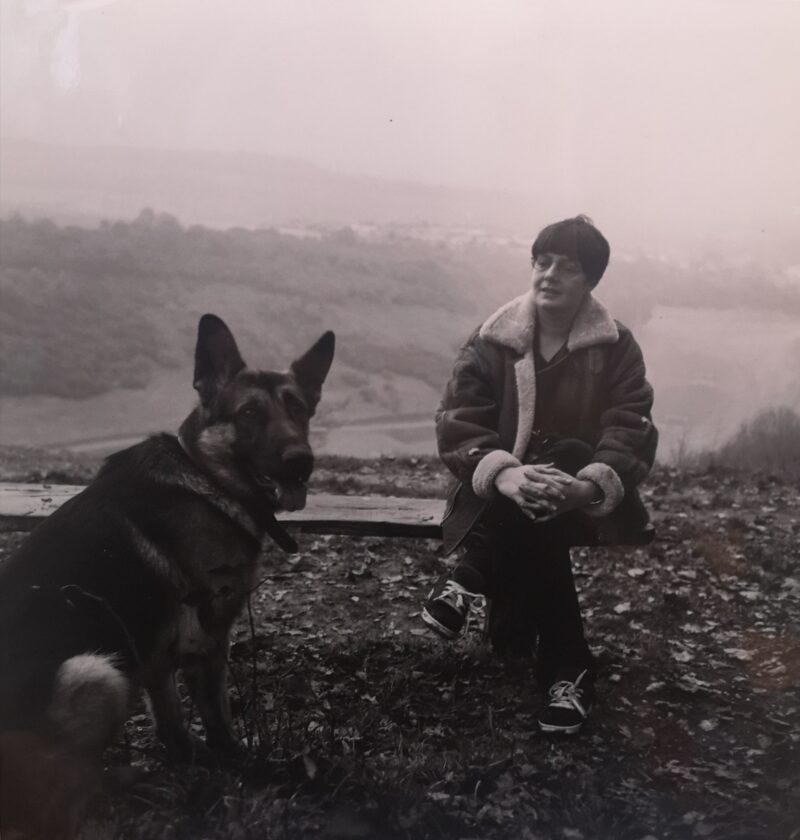
C: How did you become involved in setting up SN? What was it like in that first meeting?
K: Survivors’ Network came into existence because a woman left £16k for female survivors of childhood sexual exploitation (CSE) in her will. A meeting was called, and I was invited along by Sue Berelowitz because I was part of another project she ran. She later became the deputy UK Children’s Commissioner.
I was only twenty six when it started in 1990, and I hadn’t been involved in anything like it before. We came together as a group of survivors of CSE – at the start, that was a requirement – at the Claremont, and worked out what we wanted to create. The group was unlike anything I had ever seen – the lesbian women were the leading lights, the women that had the most energy, and the most likely to be more politically aware. I think I was one of the only straight women on the committee!
There was definitely a challenge with everyone in the management committee being survivors of CSE – there were a lot of very damaged people trying to work together, and we argued a lot! It was interesting to see how people can replicate abuse they’ve experienced or worked with, but also how hard survivors work to not do that. We got the project off the ground and brought professionals in to sit on the committee with us, including someone from Rape Crisis.
With the £16k we were able to employ a co-ordinator and an administrator, and we were given a free space to use in the Claremont – an office, and another room for the phoneline. The rest of us were volunteers – I took on the role of secretary & publicity officer and stayed on the committee until March 1993.
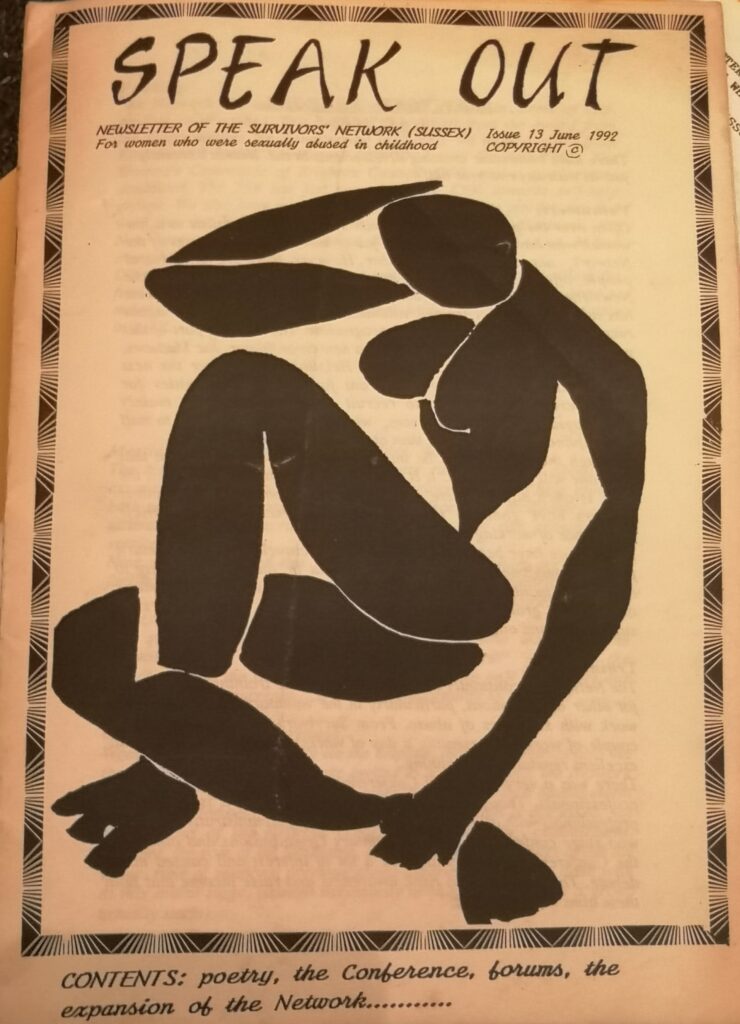
C: When you set it up, what were your ambitions?
K: We wanted to have a phone line, a safe house, to offer therapy, to have a monthly drop-in, and to run training & awareness raising.
C: Just small ambitions, then, for a brand-new group!
K: Very small ambitions! But we did pull it off, other than the safe house. By 1991 the phone line had been running for a year, for 3 days a week. It was run by the committee & volunteers, with specific training put together by professionals on the committee, and proper boundaries and police checks to make sure we ran it properly. We had therapy delivered by volunteer trained therapists, and a monthly drop-in – in the time I was there we helped thousands of women.
We supported a lot of women who were self-harming too, which was quite a new phenomenon at the time (at least for me), and a lot of suicidal women. We worked with women who had been abused by people who were very high up in society, too – in the same way we would support anyone else. The damage is the same.
C: How did survivors find out about the service and get in touch?
K: People could refer themselves in, and we had a membership system to support our work and for people to get the magazine, “Speak Out”. We had newsletters and leaflets, we wrote press releases. We were invited to speak at international conferences, and we held our own conference too, at the Brighthelm.
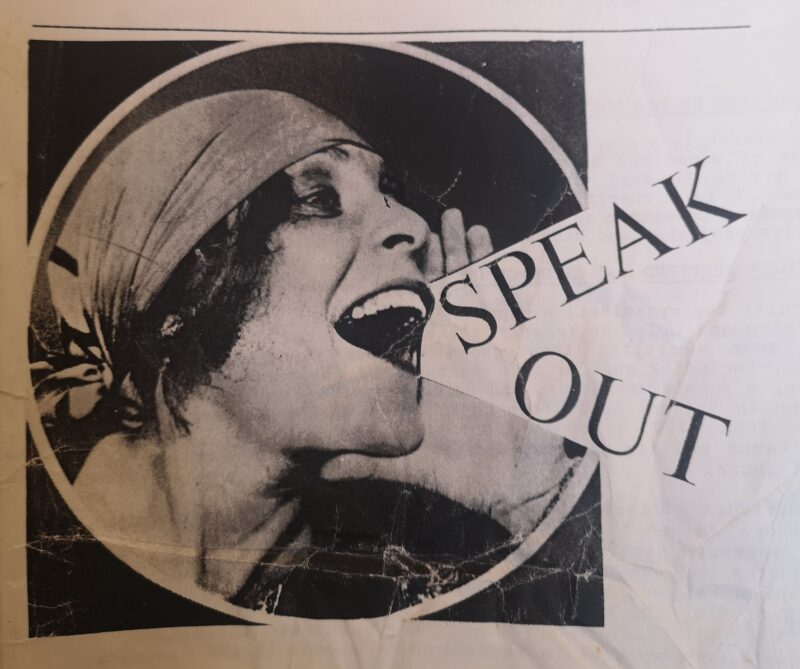
C: Can you describe the political /social context at the time around rape and sexual violence?
K: It was a very different time. Women could still be legally raped within their marriage until 1994, and in my childhood the Paedophile Information Exchange was able to run legally, which spoke volumes about our society. They were funded until 1984. There was a leading psychiatrist in the late 1970s who said that in his 25 years of practice he’d only met one survivor of child sexual abuse. Of course, that’s just a sign that no one was listening, or that people didn’t feel safe to disclose.
Childhood sexual abuse was just not talked about, so we faced a lot of backlash in public when we set up Survivors’ Network. People were outraged. We were called anti-male – even though we were having difficult conversations about women as abusers, too. People shouted at me in the street, said “least said, soonest mended”, told us to keep our noses out of it, that we were disgusting. There was a reluctance to talk about it, but of course if you’re living with it you need to speak about it.
We also faced criticism for not including male survivors, though we offered to help men to set up an equivalent group – and our funding was very specifically for female survivors.
We were a leading light in the world, really. We were one of the first organisations speaking specifically about CSE and led by people with that experience.
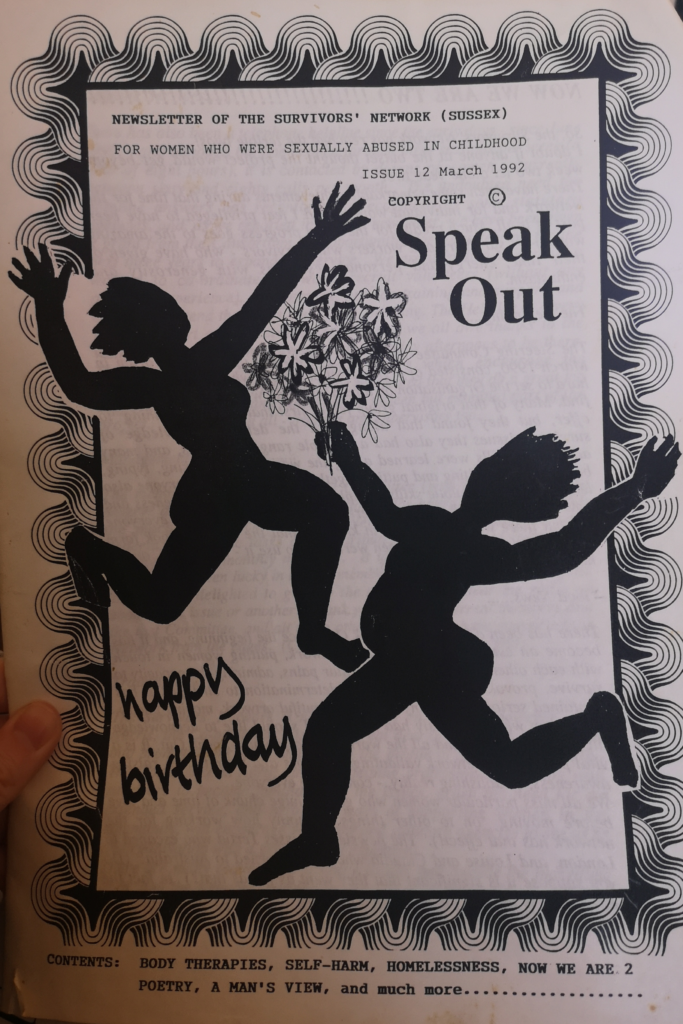
C: Do you feel like things have changed a lot in this line of work in the last 30 years?
K: At least people talk about it now, much more – in that respect, we’ve come quite far. And there are more organisations that people can go to for support, and they’re more likely to be believed.
But in many ways I think it’s worse – back then it was so much easier to access refuge and support, access to housing was easier, dole money was easier. I’m surprised, now, by how often women aren’t able to leave abusive situations. It seems like there’s a lack of funding, less spaces to go, and homelessness is so much more visible, especially for women.
C: It’s definitely changed a lot since 1990! I think being believed when survivors first disclose is still a massive issue that a lot of survivors face, though. There’s more of a culture of belief, particularly since #MeToo, but I think there’s a lot of backlash from that as well. It’s something that is raised again and again, from people coming through our services – that being believed is actually the most powerful part of the healing journey, more than what happens in court. Being able to speak to people who really believe you is really vital for processing your experiences.
But we’re not shouted at in the street anymore, at least, so that has definitely changed!
K: Definitely! I did think it was really interesting during lockdown that these issues have been discussed in Parliament, recognising that people could be locked down with their abusers. That felt like a step forward, to have that kind of acknowledgement. I don’t think, thirty years ago, that would even have occurred to anybody.
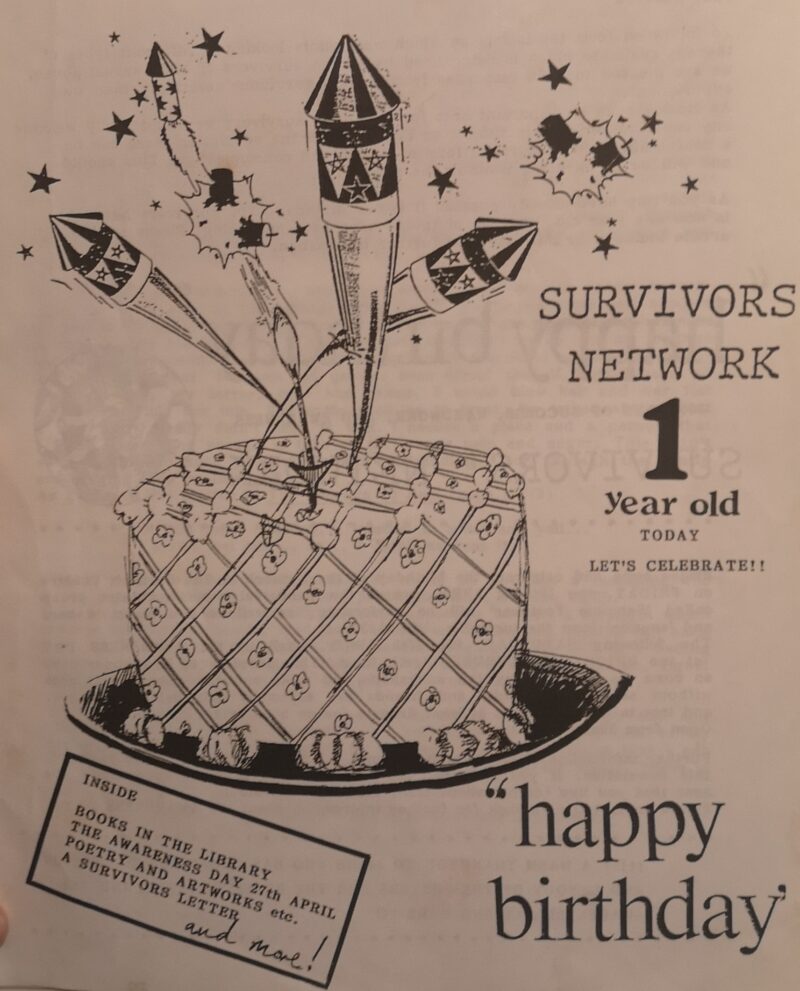
C: What did you do next, personally?
K: I studied law at Sussex Uni when I was 28, then left and worked for Brighton Women’s Centre on the “Launch project”, where we offered training for disadvantaged women. The project became a Green Paper for the government, it was very successful, and I went on to developing children’s services in Brighton. I was quite fearless in my career, which in part came from being part of Survivors’ Network, knowing that it was okay to say “no, this is how this needs to be”.
I definitely went through a phase of feeling like everyone was a survivor. It took stepping away from this work to realise that people can have nice childhoods! I later became a foster carer, and I made sure my foster children knew that I would always believe them if they came to me, and gave them the language they needed.
C: Is there anything you’d like to say to the current Survivors’ Network team?
K: I’m really delighted that it’s still going and that you’re still supporting and helping women – and that that enormous effort that we did in the beginning was worth it. It really took over all of our lives, we worked really hard and none of us were paid. It’s really lovely that it has grown, and that people are still taking it seriously and doing something about it. I’m really pleased for you, and I’m really proud of you.
C: Thank you, and thank you for putting in all of that work in 1990 to make all of this possible. It really is on your shoulders, and your fellow founders, that this organisation has grown. You created something truly good, and the fact that we are here thirty years on is testament to that.
If you would like to support Survivors' Network for our next thirty years, you can donate to our Birthday appeal here.